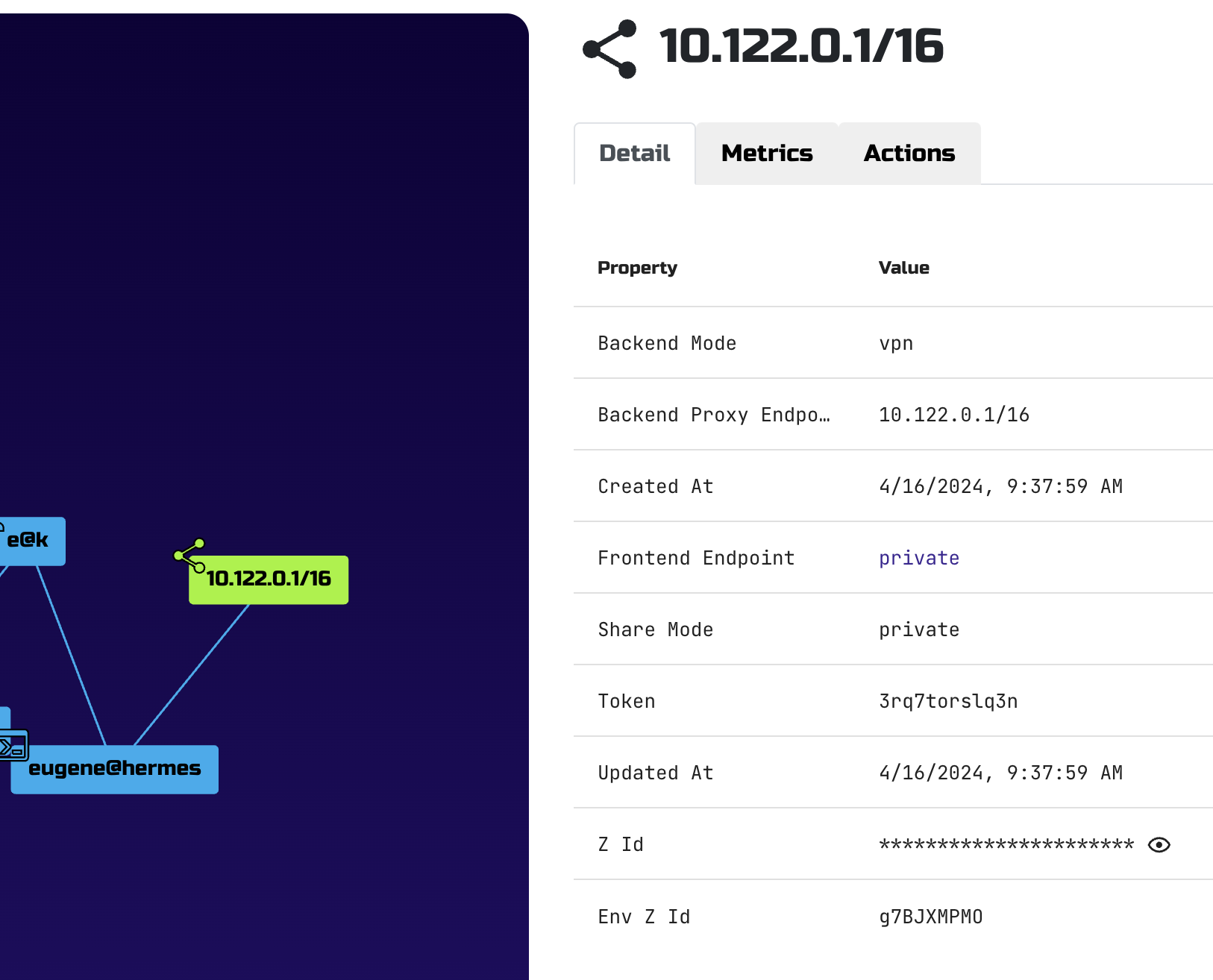4.4 KiB
| sidebar_label |
|---|
| VPN |
zrok VPN Guide
zrok VPN backend allows for simple host-to-host VPN setup.
Starting VPN server
VPN is shared through the vpn backend of zrok command.
eugene@hermes $ sudo -E zrok share private --headless --backend-mode vpn
[ 0.542] INFO sdk-golang/ziti.(*listenerManager).createSessionWithBackoff: {session token=[589d443c-f59d-4fc8-8c48-76609b7fb402]} new service session
[ 0.705] INFO main.(*sharePrivateCommand).run: allow other to access your share with the following command:
zrok access private 3rq7torslq3n
[ 0.705] INFO zrok/endpoints/vpn.(*Backend).Run: started
sudo or equivalent invocation is required because VPN mode needs to create a virtual network device (tun)
-E option allows zrok to find your zrok configuration files (in your $HOME/.zrok)
By default vpn backend uses subnet 10.122.0.0/16 and assigns 10.122.0.1 to the host that stared VPN share.
$ ifconfig
tun0: flags=4305<UP,POINTOPOINT,RUNNING,NOARP,MULTICAST> mtu 16384
inet 10.122.0.1 netmask 255.255.0.0 destination 10.122.0.1
inet6 fe80::705f:24e4:dcfc:a6b2 prefixlen 64 scopeid 0x20<link>
inet6 fd00:7a72:6f6b::1 prefixlen 64 scopeid 0x0<global>
unspec 00-00-00-00-00-00-00-00-00-00-00-00-00-00-00-00 txqueuelen 500 (UNSPEC)
RX packets 0 bytes 0 (0.0 B)
RX errors 0 dropped 0 overruns 0 frame 0
TX packets 27 bytes 3236 (3.2 KB)
TX errors 0 dropped 0 overruns 0 carrier 0 collisions 0
Default IP/subnet setting can be overridden by adding <target> parameter:
$ sudo -E zrok share private --headless --backend-mode vpn 192.168.42.12/24
VPN share reservation
Share reservation works the same as with other backend types:
eugene@hermes $ zrok reserve private -b vpn
[ 0.297] INFO main.(*reserveCommand).run: your reserved share token is 'k77y2cl7jmjl'
eugene@hermes $ sudo -E zrok share reserved k77y2cl7jmjl --headless
[ 0.211] INFO main.(*shareReservedCommand).run: sharing target: '10.122.0.1/16'
[ 0.211] INFO main.(*shareReservedCommand).run: using existing backend target: 10.122.0.1/16
[ 0.463] INFO sdk-golang/ziti.(*listenerManager).createSessionWithBackoff: {session token=[22c5708d-e2f2-41aa-a507-454055f8bfcc]} new service session
[ 0.641] INFO main.(*shareReservedCommand).run: use this command to access your zrok share: 'zrok access private k77y2cl7jmjl'
[
Accessing VPN share
Accessing a VPN share works similar to other backends.
eugene@calculon % sudo -E zrok access private --headless k77y2cl7jmjl
[ 0.201] INFO main.(*accessPrivateCommand).run: allocated frontend '50B5hloP1s1X'
[ 0.662] INFO main.(*accessPrivateCommand).run: access the zrok share at the following endpoint: VPN:
[ 0.662] INFO main.(*accessPrivateCommand).run: 10.122.0.1 -> CONNECTED Welcome to zrok VPN
[ 0.662] INFO zrok/endpoints/vpn.(*Frontend).Run: connected:Welcome to zrok VPN
Starting zrok access to a VPN share creates virtual network device/interface:
eugene@calculon ~ % ifconfig
...
utun5: flags=8051<UP,POINTOPOINT,RUNNING,MULTICAST> mtu 1500
inet 10.122.0.3 --> 10.122.0.1 netmask 0xff000000
inet6 fe80::ce08:faff:fe8a:7b25%utun5 prefixlen 64 scopeid 0x14
nd6 options=201<PERFORMNUD,DAD>
...
At this point a VPN tunnel is active between your server and client.
In the example above server is hermes(10.122.0.1) and client is calculon(10.122.0.3).
You can access server from client by using assigned IP address.
eugene@calculon ~ % ssh eugene@10.122.0.1
Welcome to Ubuntu 23.10 (GNU/Linux 6.5.0-27-generic x86_64)
* Documentation: https://help.ubuntu.com
* Management: https://landscape.canonical.com
* Support: https://ubuntu.com/pro
0 updates can be applied immediately.
Last login: Tue Apr 16 09:27:13 2024 from 127.0.0.1
eugene@hermes:~$ who am i
eugene pts/8 2024-04-16 10:04 (10.122.0.3)
eugene@hermes:~$
You can also make a reverse(server-to-client) connection:
eugene@hermes:~$ ssh 10.122.0.3
The authenticity of host '10.122.0.3 (10.122.0.3)' can't be established.
<..snip..>
Warning: Permanently added '10.122.0.3' (ED25519) to the list of known hosts.
(eugene@10.122.0.3) Password:
Last login: Tue Apr 16 09:57:28 2024
eugene@calculon ~ % who am i
eugene ttys008 Apr 16 10:06 (10.122.0.1)
eugene@calculon ~ %
